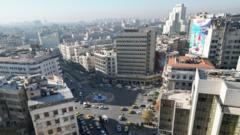Israel's latest military operations underscore its ongoing campaign to mitigate threats from extremist groups and maintain its territorial claims in the region.
Israel Strikes Syrian Coast in New Wave of Airstrikes Amid Ongoing Conflict

Israel Strikes Syrian Coast in New Wave of Airstrikes Amid Ongoing Conflict
Recent Israeli airstrikes on Syria's coastal region highlight growing tensions following the fall of the Assad regime, targeting military positions with no immediate reports of casualties.
Israel has launched a series of airstrikes on Syria's coastal area targeting military installations in response to changes in the balance of power following the removal of the Assad government.
Israel conducted a significant offensive against Syria's coastal region overnight, as reported by the Syrian Observatory for Human Rights. The strike aimed at dismantling military infrastructure following the recent ousting of the Assad regime. The military action involved a succession of airstrikes, which observers noted comprised the most intense bombardment in that region since 2012, totaling 18 strikes that led to secondary explosions due to detonations in missile warehouses and air defense locations.
Israeli officials assert that these operations are essential for preventing military resources from falling into the hands of extremists. The Israeli military has executed over 450 airstrikes in Syria since the Assad government faced a coup earlier this month. On the ground, Israel continues to occupy parts of the Golan Heights, which were seized during the 1967 Arab-Israeli War. This territory remains a contentious and internationally disputable area.
Recent developments have prompted a government decision in Israel to approve expanded settlement initiatives in the Golan Heights, indicating a strategic intention to bolster its presence in light of the new conflict dynamics following the regime change in Syria.
Ahmed al-Shara, a leading figure in the newly formed rebel coalition governing Syria, expressed concerns over Israel's territorial ambitions, labeling them as unjustified acts of aggression. However, he also emphasized the urgent need for Syria to focus on stabilization and rebuilding efforts rather than engaging in further military confrontations.
The evolving landscape poses questions about future diplomatic relations and the overall stability of the region, as both sides navigate the complexities of post-conflict realities and external pressures.
Israel conducted a significant offensive against Syria's coastal region overnight, as reported by the Syrian Observatory for Human Rights. The strike aimed at dismantling military infrastructure following the recent ousting of the Assad regime. The military action involved a succession of airstrikes, which observers noted comprised the most intense bombardment in that region since 2012, totaling 18 strikes that led to secondary explosions due to detonations in missile warehouses and air defense locations.
Israeli officials assert that these operations are essential for preventing military resources from falling into the hands of extremists. The Israeli military has executed over 450 airstrikes in Syria since the Assad government faced a coup earlier this month. On the ground, Israel continues to occupy parts of the Golan Heights, which were seized during the 1967 Arab-Israeli War. This territory remains a contentious and internationally disputable area.
Recent developments have prompted a government decision in Israel to approve expanded settlement initiatives in the Golan Heights, indicating a strategic intention to bolster its presence in light of the new conflict dynamics following the regime change in Syria.
Ahmed al-Shara, a leading figure in the newly formed rebel coalition governing Syria, expressed concerns over Israel's territorial ambitions, labeling them as unjustified acts of aggression. However, he also emphasized the urgent need for Syria to focus on stabilization and rebuilding efforts rather than engaging in further military confrontations.
The evolving landscape poses questions about future diplomatic relations and the overall stability of the region, as both sides navigate the complexities of post-conflict realities and external pressures.





















